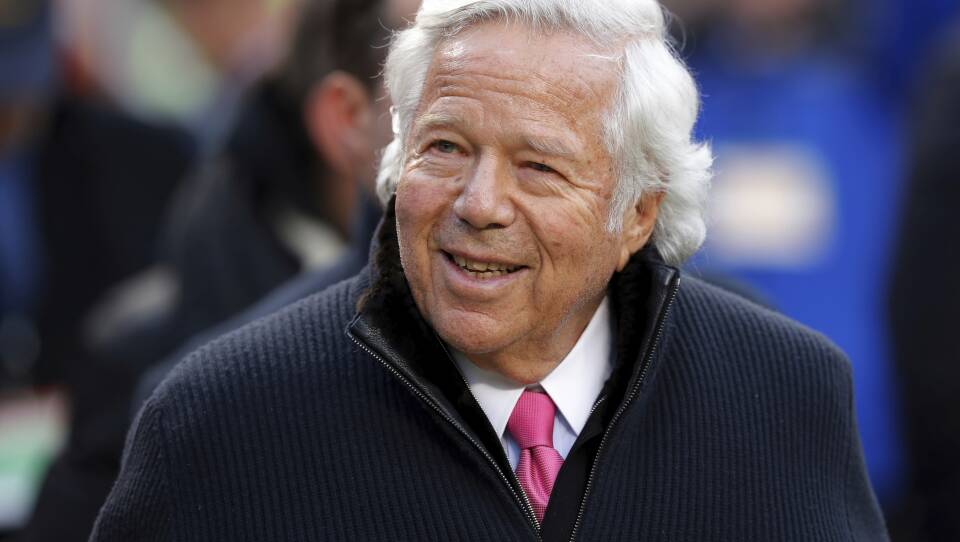New England Patriots owner Robert Kraft was accused of soliciting prostitution in Florida on Friday. Police in Jupiter, Florida say the charges against Kraft come as part of a larger investigation into sex trafficking in Florida massage parlors, like the one that Kraft allegedly patronized. WGBH Radio's Phillip Martin has reported on human trafficking. He spoke with WGBH All Things Considered anchor Barbara Howard about his reporting and its connection with what Kraft is accused of. This transcript has been edited for clarity.
Barbara Howard: So Kraft is accused of being a client. In this case, he's facing misdemeanors. He has denied any wrongdoing through a spokesperson, but the larger issue is human trafficking, and it occurs pretty often in massage parlors, right?
Phillip Martin: That's right. Massage parlors are one of many venues, and one of the more profitable venues, for human trafficking/prostitution. Those ideas and that activity converges — human trafficking and prostitution — when many women, and it is in fact many women, are coerced or forced into the trade.
Howard: What is the difference between sex trafficking and garden variety prostitution?
Martin: In many ways the terminology has changed. There are differences. Human trafficking became something that law enforcement began to recognize in the 1990s. Many of these people are basically coerced or forced into it. Debt becomes a major factor for people selling their bodies.
Howard: And these people are not necessarily Americans. These are often women who maybe have a language barrier, keeping them from getting help.
Martin: At least in the massage parlor industry, a lot of men fetishize Asian women. And tongs — organized crime groups out of East Asia — are responsible, along with Koreans, for most of the massage parlor operations in United States, of which there are about 9,000.
Read more: Illicit Massage Parlors Are Across Massachusetts. Why Is Police Action So Rare?
Howard: How does that work? They actually bring women over from Asia?
Martin: Think about it this way: a lot of people want to come to the United States. Some women who've come to the United States have come and owed massive amounts of money. Sometimes it's up to $70,000. Looking for a way to pay that back, many go into the massage parlor industry.
Howard: That debt is from being smuggled?
Martin: That debt is from being smuggled.
Howard: And when they get here and they're in trouble, even if they want to escape, it must be very difficult, especially because of the danger involved, but also the language barrier.
Martin: Well that's right. Quite often, many of these women have their passports confiscated when they arrive here. But those who don't have their passports confiscated, they still owe a debt. Language is a major problem. It's a major problem for law enforcement.
Howard: Is there danger, even if they try to escape, that there will be repercussions for their family back in their home countries?
Martin: Yes, there is that danger. There's also the problem of immigration here in the United States, especially during the Trump era. Many of them came in illegally. Some of these women have been deported. And what advocates say is, Why deport them? T visas, trafficking visas, basically assist in the arrest of those who are operating these illicit massage parlors.
Howard: To give them an incentive to actually step up and turn themselves in.
Martin: Precisely.
Howard: How big a problem is it in Massachusetts?
Martin: It's major. Massachusetts has a loophole that's called the "bodyworks loophole," which means that you can operate illicit massage parlors using the term “bodyworks” in order to cover your tracks. And this is happening and has happened with about 200 operations or more in Massachusetts. And many of the women who work in these operations are trafficking victims.
Howard: And what's being done about that?
Martin: The Massachusetts Attorney General's office has been vigorous in attacking this, as have individuals like Lt. Donna Gavin of the Boston Police. But what you have is a sort of willy-nilly way of stamping this problem out if you do not close the bodyworks loophole.
Read more: Responses And Solutions To The Spread Of Storefront Massage Parlors
Howard: Well getting back again to Robert Kraft, who is accused of having solicited for sex in Florida — what part do men like that, if in fact he is found to be at fault here, play in this whole system?
Martin: Quite simple. They fuel the massage industry. They pay for illicit sex. That's the incentive. As long as you pay for it, those who run it are going to continue to operate illicit massage parlors.
Howard: That’s WGBH Radio's Phillip Martin, talking with us about the issue of human trafficking. This following news that Patriots' owner Robert Kraft is facing charges of soliciting prostitution at a massage parlor in Florida. The allegations against Kraft come as part of a bigger investigation in Florida into possible human trafficking at massage parlors. This is WGBH’s All Things Considered.





